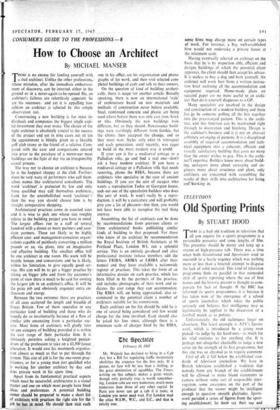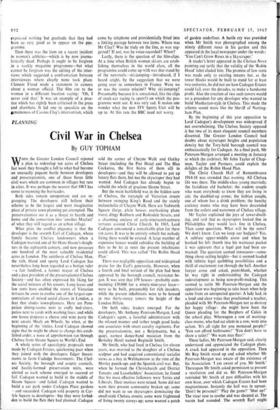Old Sporting Prints
TELEVISION
By STUART HOOD
TMERE is a bad old tradition in television that all you require for a sports programme is a personable presenter and some lengths of film. The presenter should be matey and keep up a stream of high-pressure talk. There was a time when both Grandstand and Sportsyiew used to succumb to a hectic urgency which was nothing more or less than a feverish attempt to disguise the lack of solid material. This kind of television programme finds its parallel in that outmoded style of sports reporting where the use of first names and the historic present is thought to com- pensate for lack of thought. If the BBC has reformed its sports programmes, it is because it has taken note of the emergence of a school of sports journalists which takes the public seriously and believes that intelligence may as legitimately be applied to the discussion of a football match as to politics.
Unfortunately, the old techniques linger on elsewhere. The latest example is ATV's Sports- week, which is introduced by a young man picked—to judge by the hand-outs—as much for his vital statistics as for anything else. It is perhaps not altogether charitable to judge a new series on the strength of its first programme, but this one was so abysmal as to require comment.
First of all, it fell below the established stan- dards of television journalism. We have in British television established a tradition that nobody from any branch of the establishment will be allowed to make bland statements to camera without some sort of responsible inter- rogation, some awareness on the part of the producer that the viewer might be intelligent enough to question smooth platitudes. Sports- week paraded a series of figures from the sport- ing establishment, let them say their say and
expressed nothing but gratitude that they had been so very good as to appear on the pp: gramme.
Then there was the item on a recent incident in women's athletics—which is by now journa- listically dead. Perhaps it ought to be forgiven in a weekly magazine programme—but what cannot be forgiven was the editing of the inter- views which suggested a confrontation between interviewees where clearly none took place. Clement Freud made a statement to camera about a woman official. The film cut to the woman in a different location saying: 'Oh, I never said that.' It was an example of a prac- tice which has rightly been criticised in the press and elsewhere. It led one to speculate on the genuineness of Cassius Clay's intervention, which came by telephone and providentially fitted into a linking passage between two items. Where was Mr Clay? Was he truly on the line, as was sug- gested? If not, was he voice-recorded? When?
Lastly, there is the question of the film-clips. At a time when British women ski-ers are estab- lishing themselves in the world class, all the programme could come up with was that stand-by of the newsreels—ski-jumping—introduced, if I heard aright, by the suggestion that we were going over to somewhere in France. Were we or was the source telecine? Why ski-jumping? Presumably because it is sensational, like the clips of stock-car racing (a sport?) on which the pro- gramme went out. It was very sad. It makes one wonder what the new ITV Sports Unit will be up to. At this rate the BBC need not worry.






























 Previous page
Previous page